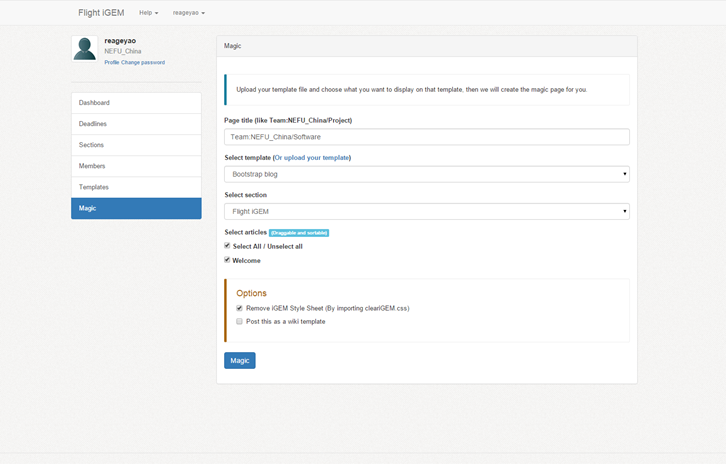Difference between revisions of "Team:NEFU China/Software"
m |
m |
||
| Line 296: | Line 296: | ||
<div class="row"> | <div class="row"> | ||
<div class="sub-container"> | <div class="sub-container"> | ||
| − | <div class="col-xs-12 col-md-12" style="text-align:center;"><img src=" | + | <div class="col-xs-12 col-md-12" style="text-align:center;"><img src="https://static.igem.org/mediawiki/2015/9/9b/NEFU_China_3702A597-6FFB-4715-990E-36F15066FBF3.png" /></div> |
<div class="col-xs-12 col-md-12 msg"> | <div class="col-xs-12 col-md-12 msg"> | ||
| + | <em class="up"></em> | ||
<p> </p> | <p> </p> | ||
</div> | </div> | ||
Revision as of 15:52, 13 September 2015
Attitudes towards creating a wiki
According to a survey conducted by us, we found that most teams agrees the thesis that creating wiki is a difficult or tedious work to finish with high quality, especially when time is very limited. So, we’d like to make some changes.
*You can see all raw data by click this.

A typical iGEM wiki can be divided into no less than 8 sections (like the home page, project, safety, team, and so on). Under each section, there are a lot of issues which you want to present. Just like the ‘Project’ section, you may need to tell others about your background information, design, etc. Tedious as it is, we, the same as other 52 teams (52/56), believe that online collaboration can improve the efficiency of creating a wiki. Flight iGEM provides you an online platform, in which you can collaborate with your teammates, so every teammate can create page and edit them at any time or anywhere. To avoid version conflict(covered by others’ edition), we mimic the concept of SVN. You can click me to watch a short video which explains how it works.

Considering that 83% teams (54/65) have encountered the situation that the iGEM server got slower or went down when it is close to the freeze of wiki, we decide to linearize all our request. It means if you want to build up a page and post it to iGEM server, you have to queue for a while until people who requested before you finished their query. To speed up all the requests, we create more than ten queues, which we believe is enough to handle them.



 Flight iGEM requires you and your teammates to work online. We use CKEditor(a free, Open Source HTML text editor) to set up edit environment like Word or iWork.
Flight iGEM requires you and your teammates to work online. We use CKEditor(a free, Open Source HTML text editor) to set up edit environment like Word or iWork.




